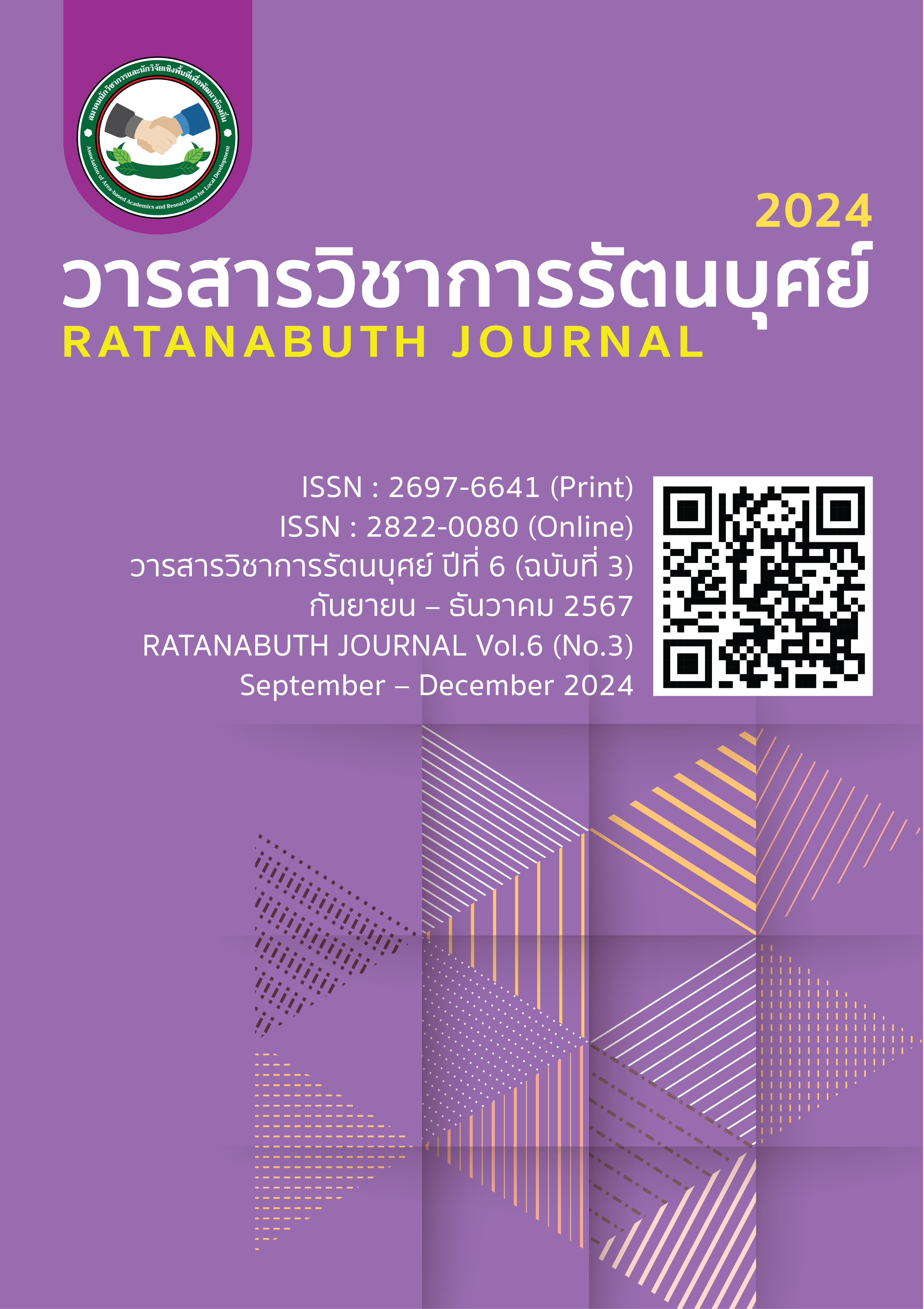Factors affecting the performance of duties of community development volunteers in Sam Chai District Kalasin Province Factors affecting the performance of duties of community development volunteers in Sam Chai District Kalasin Province
Main Article Content
Abstract
This research study has the objectives: 1) to study the level of duty performance of community development volunteers in the Sam Chai District, Kalasin Province; 2) to study the factors affecting the duty performance of community development volunteers in the Sam Chai District, Kalasin Province; and 3) to study the recommendations concerning the factors affecting the duty performance of community development volunteers in the Sam Chai District, Kalasin Province. The sample group consisted of 119 community development volunteers, determined using Taro Yamane’s formula. The research tools included a rating scale questionnaire. The statistics used for data analysis were percentage, mean, frequency, standard deviation, and multiple regression analysis.
The research results revealed that: 1) the overall level of duty performance of community development volunteers in the Sam Chai District, Kalasin Province, was high; 2) the factors affecting the duty performance of community development volunteers in the Sam Chai District, Kalasin Province, included motivation factors, servant leadership factors, and government support factors. The multiple correlation coefficient was .733, which collectively explained 53.70% of the variance with statistical significance at the .05 level; and 3) the recommendations Resources should be allocated adequately to support the work of community development volunteers, including reviewing compensation and increasing appropriate benefits. Additionally, it is important to promote adherence to democratic principles by asking for the public's needs and allowing them to express their opinions in community development. Organizing volunteer activities within the community to develop various aspects collaboratively with community members will enhance cooperation in the development process. Emphasis should also be placed on developing the leadership skills of community development volunteers by fostering a clear vision, enhancing effective communication skills, and encouraging community participation sustainably.
Article Details

This work is licensed under a Creative Commons Attribution-NonCommercial-NoDerivatives 4.0 International License.
References
กรมการพัฒนาชุมชน กระทรวงมหาดไทย. (2559). แนวทางการดำเนินกิจกรรมตามยุทธศาสตร์. กรมการพัฒนาชุมชนประจำปีงบประมาณ พ.ศ. 2560. กรมการพัฒนาชุมชน.
กรมพัฒนาชุมชน. (2557). คู่มือสนับสนุนการปฏิบัติงานผู้นำอช. ต้นแบบ. กรุงเทพ : สำนักงานส่งเสริมความเข้มแข็งชุมชน กรมพัฒนาชุมชน กระทรวงมหาดไทย.
ชาญชัย จิวจินดา และสมบูรณ์ สุขสาราญ. (2560). ยุทธศาสตร์การสร้างผู้นำอาสาพัฒนาชุมชน (ผู้นำ อช.) ของกรมการพัฒนาชุมชน. วารสารรังสิตบัณฑิตศึกษาในกลุ่มธุรกิจและสังคมศาสตร์, 3(1-2), 84-98.
ชูศรี วงศ์รัตนะ. (2553). เทคนิคการใช้สถิติเพื่อการวิจัย. (พิมพ์ครั้งที่12). กรุงเทพฯ: ไทเนรมิตกิจ อินเตอร์ โปรเกรสซิฟ.
ธวัชชัย อุทาทิพย์. (2563). ปัจจัยที่ส่งผลต่อการแสดงออกตามบทบาทหน้าที่ของผู้นำอาสาพัฒนาชุมชนในงานพัฒนาชุมชนเชิงพื้นที่อย่างมีประสิทธิภาพ พื้นที่จังหวัดร้อยเอ็ด. วิทยานิพนธ์รัฐประศาสนศาสตรมหาบัณฑิต. มหาสารคาม: มหาวิทยาลัยราชภัฏมหาสารคาม.
บุญชม ศรีสะอาด. (2556). การวิจัยเบื้องต้น. พิมพ์ครั้งที่ 9. กรุงเทพฯ : สุวรีิยาสาส์น.
พิสิฐ โอ่งเจริญ. (2563). รูปแบบการเพิ่มประสิทธิผลในการพัฒนาศักยภาพอาสาสมัครพัฒนาสังคมและความมั่นคงของมนุษย์ (อพม.) เพื่อการพัฒนาชุมชน. วารสารวิชาการมหาวิทยาลัยนอรทกรุงเทพ, 9(1). 67-68.
สมพร เทพสิทธา. (2548). เศรษฐกิจพอเพียงตามแนวพระราชดำริ. สำนักพิมพ์ธรรมสาร. กรุงเทพฯ.
สำนักงานพัฒนาชุมชนจังหวัดกาฬสินธุ์. (2567). จำนวนอาสาพัฒนาชุมชน (อช.) ในเขตพื้นที่อำเภอสามชัย จังหวัดกาฬสินธุ์. กาฬสินธุ์: สำนักงานพัฒนาชุมชนจังหวัดกาฬสินธุ์.
สุดารัตน์ ตันติวิวัทน์. (2565). โมเดลความสัมพันธ์เชิงสาเหตุของภาวะผู้นำที่แท้จริงในผู้นำอาสาพัฒนาชุมชน ผู้นำอาสาพัฒนาชุมชน. วิทยานิพนธ์รัฐประศาสนศาสตรมหาบัณฑิต. กรุงเพพฯ: มหาวิทยาลัยมหาวิทยาลัยศรีนครินทรวิโรฒ.
Blanchard, K., & Kirby, M. D. (2003). The leadership pill: The missing ingredient in motivating people today. Free Press.
Covey, S. R. (1998). The 7 habits of highly effective teens. Simon & Schuster.
Dwyer, P., & Burnside, R. (2021). Motivational factors influencing volunteer engagement: A meta-analysis of volunteer functions. Journal of Community Psychology, 49(3), 400-420.
Gambrell, K. M., Matkin, G. S., & Burbach, M. E. (2011). Cultivating leadership: The need for renovating models to higher epistemic cognition. Journal of Leadership and Organizational Studies, 18(3), 308–319.
Greenleaf, R. K. (2002). Servant leadership: A journey into the nature of legitimate power and greatness. Paulist Press.
Herzberg, F. (1959). The motivation to work. John Wiley & Sons, Inc.
Schermerhorn, J. R. (2003). Management (8th ed.). John Wiley & Sons.
Yamane, T. (1973). Statistics: An Introductory Analysis. New York: Harper & Row.


